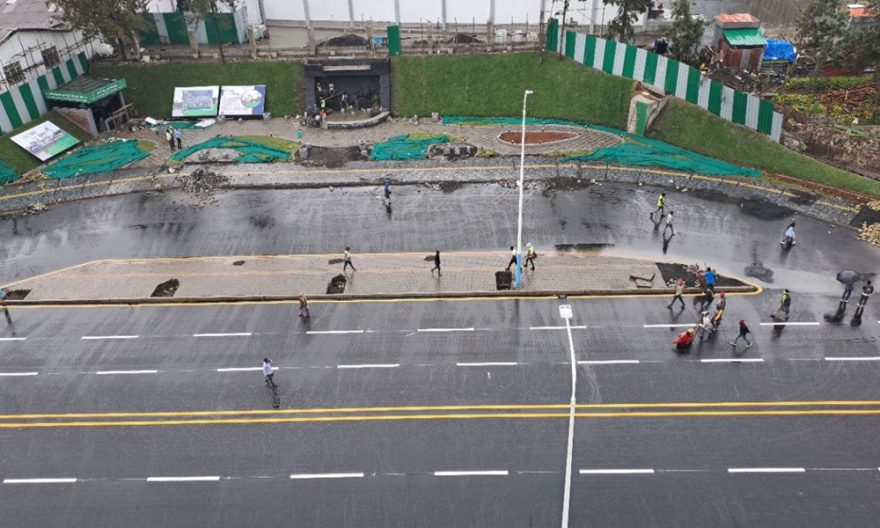
(Addis is kissing goodbye an entrenched lack of ownership and embracing conviction evolving as a culture)
New city development projects, which are implemented in Addis Ababa, are rapidly changing the images of it from squalid, disordered, less inviting and confused structure to attractive, bright coloured and moderate standards. Many agree that the on-going corridor development project in particular has clearly displayed the birth of new cultures and the extinction of old and draggy traditions.
The visionary idea of making Addis Ababa a flower, as its name depicts, inspired by Prime Minister Abiy Ahmed is seeing a day of light in the heart of the City. This is being pulled off by the unflinching commitment of task forces comprised of officials of the City Administration.
Making the city suitable for living, connecting several developments to one another, and seeing to it that Addis Ababa meets a modern city standard were some of the major objectives development projects’ entailed.
The construction of best designed asphalt roads, bicycle lines, improved sewerage systems and road side greeneries are among the several activities of the on-going corridor development project.
City Mayor Adanech Abiebie coordinates part of the corridor development from Piasa to Arat Kilo. The Mayor, who has been closely following the progress of this section of the project, recently explained the development for officials of the City Administration. According to her, the corridor development is progressing with a speedy pace, widening asphalt and pedestrian roads, accommodating bicycle lines, underground parking lots and other social service facilities. She also noted that her administration had planned to build forty eight kilo meters (KMs) of asphalt roads for vehicles, ninety six KMs of pedestrian roads, and over one hundred KMs of bicycle lines and the construction of more than half of it was complete within three months.
Part of the city, which is known as Arada, is a place where several historical sites are located. In this case, the corridor and city development projects are expected to make all the historical sites visible and attractive for tourists. “Arada is the hub of the City’s historical sites comprising most of the first modern experiences of it. The first theatre hall “Cinema Ethiopia”, the first post office, the first hotel, the statue of Abune Pettros, etc. are located in this part of the City” said the mayor. Therefore, the development projects which are on their final phases, will connect all of these historical sites with modern city facilities to allow tourist have clear image of who we were in the past and enable the City residents to experience a modern city life style”, said Adanech.
In the speedy process of the corridor development project, it was learned that a new working culture was born and some outmoded traditions were being let bygones. Past experiences have indicated some long-lived habits of launching and extending the implementation or construction of projects almost in all sectors. Delaying the construction of buildings, roads, energy projects, and factories was an entrenched bad habit of contractors and other stakeholders. This habit also exposed the Country for deep rooted corruption, compelled its economic growth face inflation, and worsened the poor working culture. Thus, it obligated that the Nation to get rid of this backward tradition begging for an exemplary step to be taken. As a result, the implementation of the new city and corridor development projects in Addis Ababa is afoot. It is being undertaken day and night showcasing there is nothing impossible if one is truly committed. There had never been a trend of project execution with such a pace, quality, complexity and the area covered by the current city and corridor development projects in such a very short period of time, according to the Mayor.
Other officials of the City Administration and residents also share the birth of a new working culture based on what they witnessed from the progress of the corridor development project. The corridor development project has also created thousands of jobs for the youths and women of the City. In this case, the City seem to have kissed goodbye to an old habit called lack of sense of ownership and warmly welcomed a strong sense of ownership, which will be expected to grow as a culture. One can observe the strong sense of ownership not only on the part of the City Administration officials that portray unflinching commitment but also on the part of the professionals to the labour forces in every level of the development.
On the other hand, the project, being multifaceted, has created a new approach on the way people view beauty and the standards of a city life style. According to the Mayor, during the demolition of parts of the City, where the corridor development project would be implemented, there had been a lot of garbage to get rid of. This indicated that the sense of beauty and city life standards had never been given much attention in the past and people got used to the low standard life styles.
Even though there were hard critics and waves of roomers created confusions on the society at the beginning, particularly when old residents were demolished, the quick corridor construction and renewal of buildings around Arat Kilo seem to fascinate residents. One can observe the transformation on sense of beauty and change from the increasing number of residents who comes out for walk and bike rides every night in the past few days.
It is also an indication that such projects do not only bring beauty and neatness but also advance people’s lives in many ways. “These initiatives are not just about construction; they are about transforming our city into a more liveable, vibrant, and sustainable environment. By enhancing the aesthetics, greenery, and infrastructure, we are not only addressing public health concerns but also generating employment opportunities for our residents. Together, these efforts will elevate Addis Ababa and truly establish it as a city that caters to the needs of all its inhabitants”, said Tiratu Beyene, Deputy Mayor on his facebook social platform page.
Additional good news was also announced by the City Mayor, which affords hope to many people whose business establishments were affected by the development projects and were left with little or no hopes of getting back to business. Adanech said, “We have no plan to displace people from their establishments but to improve the infrastructure with modern standards and enable them run their business in a civilized manner. Old buildings like the Ethiopian Electric Utilities will be renewed and turned into modern shopping moles. This way business men and women will be able gain their establishments back”.
Some optimistic residents of the city also hope, as the city and corridor development projects continue with the current pace, the realization of making Addis Ababa a flower true to its name will not be long and new cultures will continue to be born.
BY NAOL GIRMA
The Ethiopian herald May 26/2024




